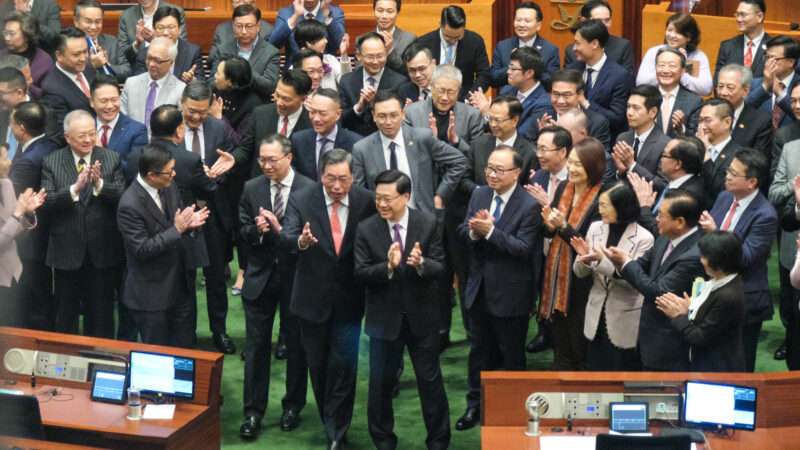
At China's behest: Yesterday, Hong Kong passed a new national security law that will create draconian penalties for all manner of political crimes. Beijing puppet/Hong Kong leader John Lee says these swiftly passed laws "allow Hong Kong to effectively prevent and put a stop to espionage activities, the conspiracies and traps of intelligence units and the infiltration and damage of enemy forces." He's trying to push a narrative that such laws—passed expeditiously over 11 days, the fastest a bill has gone through Hong Kong's legislature since 1997—are needed to thwart Western spying. But what they actually represent is a massive encroachment on the already-eroded civil liberties of Hongkongers who have been absorbed back under mainland Chinese rule.
"The law criminalizes the possession of state secrets, which some international financial firms fear could include information about the state of the economy," reports Semafor. "It also expands the definition of espionage to such an extent that it could have a chilling effect on all exchanges with foreign diplomats, one law professor at the University of Hong Kong warned the government last month."
The law, called Article 23, is needed to deal with "potential sabotage and undercurrents that try to create troubles," according to Lee, including "ideas of an independent Hong Kong."
"This is the high point of patriotism," said Lee, following the bill's passage. No, it's not.
Some background: In 1997, the British, who were colonial rulers of Hong Kong for more than 150 years, reached an agreement with mainland China to hand the island back over. One of the major conditions of the deal was that Hong Kong would for 50 years—so until 2047—maintain a high degree of political independence, including operating its own separate government under what is essentially its own separate constitution.
Then, over the course of 2019 and 2020, this agreement was violated; China put pressure on Hong Kong to pass certain laws—mostly under the guise of national security—that would undermine civil liberties Hongkongers had enjoyed for the past two decades. Those who spoke out against these actions were swiftly disappeared or fired or de facto barred from their positions of influence. Then the pandemic provided even more opportunities to surveil students and political organizers, to quash the massive protest movement that had taken to the streets to oppose Chinese Communist Party (CCP) rule, and to suppress the political norms that had formerly thrived in Hong Kong. The CCP even boldly culled Hong Kong's legislature of people deemed insufficiently "patriotic," instituting loyalty oaths to Beijing.
Now, China—with heavy cooperation from Hong Kong's leader—is finishing the task it started. Article 23 fails to define what "external interference" or "insurrection" actually mean, but deals with plenty of purported political crimes by doling out life sentences in prison. "Law-abiding people will not be caught by the law inadvertently," assures a government spokesperson; but the many people (and firms) who've reluctantly fled Hong Kong—and those who got to leave are the lucky ones—since the national security law was first imposed in 2020 would beg to differ. When the CCP gets to define what "law-abiding" means, you have no assurance you'll be safe.
Literal car salesman wins Ohio: "Bernie Moreno, a former car dealer endorsed by Donald Trump, won a three-way GOP primary Tuesday for the right to take on Democratic Sen. Sherrod Brown in Ohio," reports Politico, which calls Moreno's win "a relief for the former president."
Basically, Republicans need to win this Ohio senate seat to possibly have a majority post–Election Day. And most political commentators saw this race in particular as an opportunity for MAGAism to either be affirmed or repudiated; Moreno winning gives weight to the idea that Trump has a strong hold on Ohio—and possibly the rest of the country, too.
Scenes from New York:
wait what pic.twitter.com/a6zhPLxbea
— Jesse Singal (@jessesingal) March 19, 2024
QUICK HITS
- "Biden's budget arithmetic doesn't add up," writes the Bloomberg editorial board.
- No, the deep state is not awesome, next question.
- New York City's public schools are facing a large spike in disciplinary problems which many claim are attributable to the COVID-19 pandemic and learning disruptions. "Last school year, there were 14,048 school safety incidents, according to Police Department data," reports The New York Times. "In the 2018-2019 school year, there were 11,504." And "the number of times students were suspended or removed from class rose last year, to 36,992 from 31,738 the year before, though it remains below prepandemic levels" (some of the reason for this may be that schools have changed the degree to which they involve law enforcement in recent years).
- Delivery by drone is becoming a reality.
- Mortgage rates are approaching 7 percent, "more than twice as high as they were in 2021 before the Federal Reserve began an aggressive hiking campaign to quell inflation," reports Bloomberg.
- Incredible scenes:
The Department of Energy's head of science announced yesterday she's stepping down.
Her signature achievement, per her letter, was creating a new DEI paperwork requirement for grant applicants. pic.twitter.com/KGaEz5PmA1
— Santi Ruiz (@rSanti97) March 19, 2024
The post Hong Kong Falls, Again appeared first on Reason.com.







